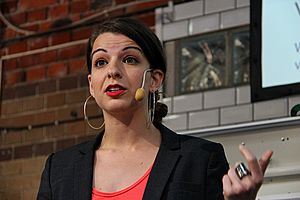Anita Sarkeesian facts for kids
Quick facts for kids
Anita Sarkeesian
|
|
|---|---|

Sarkeesian in 2011
|
|
| Born | 1983 (age 42–43) |
| Nationality | Canadian American |
| Education | |
| Occupation |
|
Anita Sarkeesian (born 1983) is a Canadian-American feminist media critic. A feminist is someone who believes in equal rights and opportunities for men and women. As a media critic, she studies and shares her opinions on how women are shown in popular culture, especially in video games.
Sarkeesian is best known for creating Feminist Frequency, a website and video series. Her most famous series, Tropes vs. Women in Video Games, looks at common patterns, or tropes, in how female characters are portrayed in video games.
In 2012, she started a fundraiser for her video game series. In response, she was targeted by a large-scale online bullying campaign. This brought a lot of media attention to her project and to the larger issue of how women are treated in the video game community. She has spoken about her experiences at major events, including TEDxWomen and the United Nations.
Contents
Early Life and School
Anita Sarkeesian was born near Toronto, Canada. Her parents were Iraqi Armenians who moved to Canada in the 1970s. She later moved to California and is a Canadian American.
She earned a bachelor's degree in communication studies from California State University, Northridge in 2007. In 2010, she received a master's degree from York University. Her final paper for her master's degree was about strong female characters in science fiction and fantasy TV shows.
Career and Feminist Frequency
| Feminist Frequency | |
|---|---|
| YouTube information | |
| Years active | 2009–present |
| Genre | Commentary |
| Subscribers | 210,000 |
| Total views | 34.2 million |
| Subscriber and view counts updated as of December 16, 2024. | |
What is Feminist Frequency?
In 2009, Sarkeesian started a website and non-profit organization called Feminist Frequency. Her goal was to make media criticism from a feminist point of view easy for everyone to understand. The videos on the site looked at how gender is shown in popular culture. For example, one video looked at how Lego toys can shape ideas about gender.
In 2011, she created a video series called Tropes vs. Women. A trope is a common pattern or idea that we see over and over again in stories. This series looked at common tropes for female characters in movies and TV shows, especially in science fiction.
Tropes vs. Women in Video Games
After speaking to video game developers at the company Bungie, Sarkeesian was inspired to create a series about women in video games. In 2012, she launched a Kickstarter campaign to raise money for it. The project was called Tropes vs. Women in Video Games.
Her goal was to raise $6,000. However, after she announced the project, she received many negative and hurtful messages online. This online bullying was widely reported in the news. The media attention led to a huge amount of support for her project, and she raised over $158,000.
The first video in the series came out in March 2013. The series examined tropes like the "Damsel in distress", where a female character is helpless and must be saved by a male hero. Many people found the series important. Chris Suellentrop of The New York Times called the videos "essential viewing for anyone interested in video games".
The series had a real impact on the video game industry. Since the series launched, many new games have featured more positive and diverse female characters. In 2015, the tech company Intel partnered with Feminist Frequency to help support women and minorities in technology and gaming.
The Tropes vs. Women in Video Games series ended in 2017. In August 2023, Sarkeesian announced that the Feminist Frequency non-profit would be closing down due to burnout. The website and its videos, including the Tropes series, remain online for people to watch.
Media Appearances and Public Speaking
The online harassment Sarkeesian faced brought her and her work into the public eye. Major news outlets like The New York Times and The Guardian wrote about her and the problems of online bullying in video game culture.
This led to many opportunities for her to speak publicly. She gave talks at the TEDxWomen conference and the XOXO Festival. She spoke about her experiences with online harassment and the importance of making video games more welcoming for everyone.
In 2014, she appeared on the TV show The Colbert Report. She explained that her goal was not to ban video games, but to raise awareness about how women are often shown as stereotypes. She wanted to encourage developers to create more realistic female characters.
Awards and Recognition
Sarkeesian has received many awards for her work.
- In 2013, Newsweek magazine named her one of its "125 Women of Impact".
- In 2014, she received the Ambassador Award at the Game Developers Choice Awards for her work on how women are represented in video games.
- In 2015, Time magazine included her on its list of the "100 Most Influential People in the World".
- In 2022, Feminist Frequency won a Peabody Award, a major award for storytelling in broadcasting and media.
See also
 In Spanish: Anita Sarkeesian para niños
In Spanish: Anita Sarkeesian para niños
 | Selma Burke |
 | Pauline Powell Burns |
 | Frederick J. Brown |
 | Robert Blackburn |



